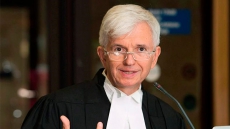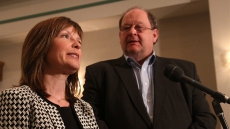OTTAWA — Why has the backlog plaguing the Conservative government's social security tribunal grown so large as ailing, injured and debt-addled Canadians denied Canada Pension Plan disability benefits wait years for appeal hearings?
Stakeholders and critics are scoffing at Employment Minister Jason Kenney's explanation that a "rigorous pre-screening process" for new tribunal members is partly to blame for an 11,000-case social security appeals backlog, mostly involving CPP disability cases.
They point out there were already 1,000 well-qualified part-time referees working in the old system who could have been approached to work on the new tribunal, or kept on while new members were being vetted, in order to prevent even further delays for some of Canada's most vulnerable citizens.
Most of those former referees were dismissed when the new tribunal launched, although some were appointed as full-time members. There are now 74 full-timers on the new panel and a freshly hired part-time complement of 22 employees.
"That seems to me a very cogent piece of evidence about their lack of respect for, or sensitivity to, the needs and the situations of the people who are making these appeals," said Ron Ellis, an administrative law lawyer and the former head of a workplace compensation tribunal.
"To design a system that you know will add a year to the delay of people getting their benefits speaks to an attitude that is quite distressing."
In an email, a tribunal spokesman didn't address why the old system wasn't kept operational while new tribunal members were being vetted.
The social security tribunal was ostensibly created to streamline the social security appeals process. When it announced it was creating the tribunal in the spring of 2012, the government also said it would save Canadian taxpayers $25 million a year by replacing four panels with a single body.
At a parliamentary committee hearing last week, Kenney pointed to the need to subject new tribunal members to a 12-month vetting process as the board prepared to launch on April 1, 2013.
"If I wanted to, I could have just dumped the rigorous pre-screening process and just appointed people off the street the next week, but I didn't think that was appropriate; I wanted to respect the rigour of the process," he said.
The minister was referring to his first days on the job in July 2013, after he took over the department from Diane Finley. He said the newly formed tribunal was "still getting tooled up" that summer, three months after its official launch.
But Philippe Rabot, the commissioner of review tribunals from 2005 to 2010, said dozens of those commissioners — some of them highly qualified referees from the previous system — sat at home doing nothing in the summer of 2013.
"They had no work assigned to them for a year," said Rabot, who's familiar with the launch period.
"The department simply wasn't ready on April 1, 2013. They didn't have enough lead time to set up such a big tribunal, and the tribunal wasn't ready to start assigning cases."
He adds that the government's approach in setting up the new tribunal was unusual.
"Typically when you do these things, you keep the old board and let the old tribunal deal with their workload so that the new tribunal can start fresh," Rabot said.
Employees in the old system jumped ship when they were informed that they would soon lose their positions, contributing further to the slowdown of appeals heard in the months leading up to the launch of the new tribunal, he added.
"Everyone was told: 'Here are your surplus notices, so go look for another job or we'll help you find one.' In other words, I don't think morale was great, and people started finding other jobs. They were losing people in droves in the final year."
Indeed, the government itself created the conditions that resulted in a ballooning backlog of cases, Rabot said.
One former referee agreed, saying her colleagues under the former system were alarmed about how the new system would impact their clients, some of whom they had come to know personally.
"When they handed me my letter, I was horrified. I asked them: 'But what about my files?'" said the former umpire, who asked not to be identified because the government might be rehiring her in an attempt to deal with the bloated backlog.
"They said: 'Don't worry, we'll handle it.' But I am distressed that I was basically dragged away and told: 'No, you don't have to serve these clients anymore, we've created the SST.' I really pray and hope they find a way to bring in help. So many people need it."





